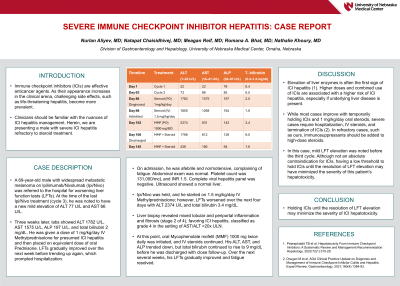Tuesday Poster Session
Category: Liver
P4733 - Severe Immune Checkpoint Inhibitor Hepatitis: Case Report
Tuesday, October 29, 2024
10:30 AM - 4:00 PM ET
Location: Exhibit Hall E


Nurlan Aliyev, MD
University of Nebraska Medical Center
Omaha, NE
Presenting Author(s)
Nurlan Aliyev, MD, Natapat Chaisidhivej, MD, Meagan S. Reif, MD, Romana A. Bhat, MD, Nathalie Khoury, MD
University of Nebraska Medical Center, Omaha, NE
Introduction: Immune checkpoint inhibitors (ICIs) are effective anticancer agents. As their appearance increases in the clinical arena, challenging side effects, such as life-threatening hepatitis, become more prevalent. Clinicians should be familiar with the nuances of ICI hepatitis management. Herein, we are presenting a male with ICI hepatitis refractory to steroid treatment.
Case Description/Methods: A 69-year-old male with widespread metastatic melanoma on Ipilimumab/Nivolumab (Ipi/Nivo) was referred to the hospital for worsening liver function tests (LFTs). At the time of the last Ipi/Nivo treatment (cycle 3), he was noted to have a new mild elevation of ALT 77 U/L and AST 66 U/L. Three weeks later, labs showed ALT 1782 U/L, AST 1575 U/L, ALP 197 U/L, and total bilirubin 2 mg/dL. He was given a dose of 1 mg/kg/day IV Methylprednisolone for presumed ICI hepatitis and then placed on equivalent dose of oral Prednisone. LFTs gradually improved over the next week before trending up again, which prompted hospitalization.
On admission, he was afebrile and normotensive, complaining of fatigue. Abdominal exam was normal. Platelet count was 131000/mcL and INR 1.5. Complete viral hepatitis panel was negative. Ultrasound showed a normal liver. His ICI was held, and he started on 1.5 mg/kg/day IV Methylprednisolone; however, LFTs worsened over the next four days with ALT 2374 U/L and total bilirubin 3.4 mg/dL. Liver biopsy revealed mixed lobular and periportal inflammation and fibrosis (stage 2 of 4), favoring ICI hepatitis, classified as grade 4 in the setting of AST/ALT >20x ULN. At this point, Mycophenolate mofetil (MMF) 1000 mg twice daily was initiated, and IV steroids continued. At the time of this report, ALT and AST plateaued, ALP stable, but total bilirubin continues to rise up to 7.8 mg/dL.
Discussion: Elevation of liver enzymes is often the first sign of ICI hepatitis. Higher doses and combined use of ICIs are associated with a higher risk of ICI hepatitis, especially if underlying liver disease is present. While most cases improve with temporarily holding ICIs and 1 mg/kg/day oral steroids, severe cases require hospitalization, IV steroids, and termination of ICIs. In refractory cases, immunosuppressants should be added to high-dose steroids. In this case, mild transaminitis was noted before the third cycle. Although not an absolute contraindication for ICIs, having a low threshold to hold ICIs until the resolution of transaminitis may have minimized the severity of this patient’s hepatotoxicity.
Note: The table for this abstract can be viewed in the ePoster Gallery section of the ACG 2024 ePoster Site or in The American Journal of Gastroenterology's abstract supplement issue, both of which will be available starting October 27, 2024.
Disclosures:
Nurlan Aliyev, MD, Natapat Chaisidhivej, MD, Meagan S. Reif, MD, Romana A. Bhat, MD, Nathalie Khoury, MD. P4733 - Severe Immune Checkpoint Inhibitor Hepatitis: Case Report, ACG 2024 Annual Scientific Meeting Abstracts. Philadelphia, PA: American College of Gastroenterology.
University of Nebraska Medical Center, Omaha, NE
Introduction: Immune checkpoint inhibitors (ICIs) are effective anticancer agents. As their appearance increases in the clinical arena, challenging side effects, such as life-threatening hepatitis, become more prevalent. Clinicians should be familiar with the nuances of ICI hepatitis management. Herein, we are presenting a male with ICI hepatitis refractory to steroid treatment.
Case Description/Methods: A 69-year-old male with widespread metastatic melanoma on Ipilimumab/Nivolumab (Ipi/Nivo) was referred to the hospital for worsening liver function tests (LFTs). At the time of the last Ipi/Nivo treatment (cycle 3), he was noted to have a new mild elevation of ALT 77 U/L and AST 66 U/L. Three weeks later, labs showed ALT 1782 U/L, AST 1575 U/L, ALP 197 U/L, and total bilirubin 2 mg/dL. He was given a dose of 1 mg/kg/day IV Methylprednisolone for presumed ICI hepatitis and then placed on equivalent dose of oral Prednisone. LFTs gradually improved over the next week before trending up again, which prompted hospitalization.
On admission, he was afebrile and normotensive, complaining of fatigue. Abdominal exam was normal. Platelet count was 131000/mcL and INR 1.5. Complete viral hepatitis panel was negative. Ultrasound showed a normal liver. His ICI was held, and he started on 1.5 mg/kg/day IV Methylprednisolone; however, LFTs worsened over the next four days with ALT 2374 U/L and total bilirubin 3.4 mg/dL. Liver biopsy revealed mixed lobular and periportal inflammation and fibrosis (stage 2 of 4), favoring ICI hepatitis, classified as grade 4 in the setting of AST/ALT >20x ULN. At this point, Mycophenolate mofetil (MMF) 1000 mg twice daily was initiated, and IV steroids continued. At the time of this report, ALT and AST plateaued, ALP stable, but total bilirubin continues to rise up to 7.8 mg/dL.
Discussion: Elevation of liver enzymes is often the first sign of ICI hepatitis. Higher doses and combined use of ICIs are associated with a higher risk of ICI hepatitis, especially if underlying liver disease is present. While most cases improve with temporarily holding ICIs and 1 mg/kg/day oral steroids, severe cases require hospitalization, IV steroids, and termination of ICIs. In refractory cases, immunosuppressants should be added to high-dose steroids. In this case, mild transaminitis was noted before the third cycle. Although not an absolute contraindication for ICIs, having a low threshold to hold ICIs until the resolution of transaminitis may have minimized the severity of this patient’s hepatotoxicity.
Note: The table for this abstract can be viewed in the ePoster Gallery section of the ACG 2024 ePoster Site or in The American Journal of Gastroenterology's abstract supplement issue, both of which will be available starting October 27, 2024.
Disclosures:
Nurlan Aliyev indicated no relevant financial relationships.
Natapat Chaisidhivej indicated no relevant financial relationships.
Meagan Reif indicated no relevant financial relationships.
Romana Bhat indicated no relevant financial relationships.
Nathalie Khoury indicated no relevant financial relationships.
Nurlan Aliyev, MD, Natapat Chaisidhivej, MD, Meagan S. Reif, MD, Romana A. Bhat, MD, Nathalie Khoury, MD. P4733 - Severe Immune Checkpoint Inhibitor Hepatitis: Case Report, ACG 2024 Annual Scientific Meeting Abstracts. Philadelphia, PA: American College of Gastroenterology.
